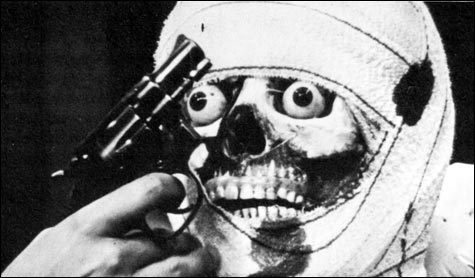
MADE IN USA: After so many Godard films in which the poet kills the girl, here the girl kills the poet. |
| “Godard in the 1960s” | Museum of Fine Arts: February 19–March 7 |
"We were indeed in a political film — that is to say, Walt Disney plus blood." You might have read that bit of '60s film voiceover in a book, but it's unlikely you've ever heard Anna Karina speak it. That's because it's from Jean-Luc Godard's "missing link" movie, the one that's called Made in USA but until last month was still waiting to open in USA. Godard made it in 1966 (in 12 days, he said), using (barely) Donald Westlake's pulp novel The Jugger. He thought the rights to the novel had been secured; they hadn't, Westlake (who died this past New Year's Eve) took offense, and the movie wound up in legal limbo, with just the occasional film-series screening. But Rialto Pictures has finally released it, last month it got two weeks at the Film Forum in New York, and now, it's the centerpiece of "Godard in the 1960s" at the Museum of Fine Arts.Made in USA's plot is perfunctory even by Godard standards. Paula Nelson (Karina) has come from Paris to "Atlantique-Cité" to investigate the death of her journalist ex-lover, Richard P— (his surname always obliterated by traffic or airplane noise or a ringing phone). She goes round and round with Richard's possible associates — Paul Widmark (László Szabó), Typhus (Ernest Menzer), Donald (Jean-Pierre Léaud), David Goodis (Yves Alfonso), Inspector Aldrich (Jean-Claude Bouillon) — and emerges none the wiser. Hints about the Kennedy assassination and the 1965 "disappearance" of Moroccan opposition leader Mehdi Ben Barka hang in the air. The soundtrack — two chords from Beethoven's Fifth Symphony, parts of his Piano Sonata No. 9, the Scherzo from Schumann's Rhenish Symphony — is nothing but repeating bursts, the same snippets over and over. The Techniscope format locks us out of Heaven and Hell. Paula shoots Donald (Léaud dying an impossibly cinematic death), and then after David saves her by shooting Widmark, she shoots David, saying, "The truth must not be known. If you finish your novel, everyone will know it, for poetry is truth." Flattened into two dimensions, Made in USA is a comic strip; the only truth it affords is color, the symphony of Paula's four Mod/Mondrian-inspired outfits.

Reviewing this movie's English DVD release on the DVD Times Web site, Noel Megahey asked, "Is there really any need for film criticism when the film is as self-reflective and self-analytical as this?" Well, no. But it is worth reiterating that Godard is Roy Lichtenstein as well as Ludwig Wittgenstein, a pop poet of sex, politics, and advertising (oh, and naked girls) as well as the New Waviest of New Wave auteurs. He looks back to old movies (especially musicals and gangster films) and ahead to graphic novels, video games, computerized societies (have you seen Alphaville lately?), and DIY filmmaking; he embraces Hollywood even as he stands it on its head. He resurfaces in the popular consciousness every time Beverly Crusher coos "Jean-Luc" into Captain Picard's ear. And is there a film title more riffed on than Two or Three Things I Know About Her?
In anticipation, then, of the MFA retrospective, which includes 10 of Godard's first 13 features (Le petit soldat, Les carabiniers, and La femme mariée are missing), two or three things to remember about Jean-Luc:
HEGEL, SCHMEGEL | Don't close the book on Godard when Georg Wilhelm Friedrich's name comes up: he's simply embracing the German philosopher's idea that reality is a synthesis of opposites. Other filmmakers give you the synthesis; Godard gives you the opposites. When the balance between them breaks down — when his dialectic turns into dialectical materialism, as in his post-Weekend œuvre — so does his filmmaking. He referred famously to the kids in Masculine Feminine as "the children of Marx and Coca-Cola." Later it became just Marx.
1 + 1 | In Alphaville, "eternal programmatrix" Alpha 60 drones, "Once we know what 1 is, we think we know what 2 is, because 1 + 1 = 2. We forget that we still have to learn what is +." The centerpiece of Godard's 1968 One Plus One is the Stones rehearsing "Sympathy for the Devil"; Godard withheld any complete, uninterrupted performance of the song from the film, but his producers slapped one on at the end and changed the title to Sympathy for the Devil. Godard should have slapped them back. (Some say he did.) In Made in USA, "1 + 1" is Paul (Widmark) and Paula facing the camera side by side and reciting, simultaneously, different monologues, each telling his or her side of the story. The viewer can barely make out either one. From Widmark we do learn that the year is 1969; a few minutes later, however, Paula and Widmark date the "confessions" they exchange "17 September 1968."